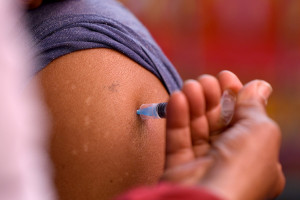Health
Rapid testing kits only for use in case of a massive outbreak, says Health Ministry
Amid concerns about the efficacy, quality and cost of the kits purchased from China, the ministry has said that it will be testing them before use..jpg&w=900&height=601)
Arjun Poudel
After forbidding private laboratories from using rapid diagnostic kits for Covid-19 tests, the Health Ministry itself has purchased thousands of such kits, spending millions from state coffers. And they might not even be of any immediate use.
“We have purchased 75,000 such test kits from China,” Dr Khem Karki, the health minister’s advisor, told the Post. “Though they are not recommended by the UN health agency, they are being used in European countries and are permitted by the US’ Food and Drug Administration.”
The United States’ Food and Drug Administration recently approved the use of a two-minute coronavirus test developed by the company Bodysphere, not the ones purchased by the Nepal government from China. Rapid test kits are neither recommended for Covid-19 tests by the World Health Organization nor by the Health Ministry itself or the Department of Drug Administration.
As each test kit costs $8, the government has spent at least $600,000 in just purchasing the 75,000 kits from China.
A number of European countries, including Spain, the Netherlands and Turkey, recently recalled thousands of pieces of Chinese-made medical equipment, including testing kits and face masks, for being defective or sub-standard.
Karki himself had dismissed the efficacy of rapid test kits, in a press briefing on Tuesday, saying that they were not reliable and were not recommended by the World Health Organization.
When pressed on his contradictory statements, Karki said that private labs are fleecing the public with rapid testing and they had only been purchased for use in case of a massive outbreak.
“We have purchased rapid diagnostic kits for use during a massive outbreak when the polymerase chain reaction (PCR) method will not be quick enough,” he said. “We have not distributed those kits yet. We will first validate them and use them only if they are found compatible in our context.”
Health care workers have so far been performing PCR tests on nasal and throat swabs from patients suspected of having Covid-19.
Mahendra Prasad Shrestha, director-general of the Department of Health Services, confirmed that the rapid diagnostic kits imported from China had been dispatched to the Nepal Health Research Council for testing.
“Rapid test kits do not give 100 percent correct results,” Shrestha told the Post. “But even if they give about 90 percent accurate results, we will use them in case of a massive outbreak. They have been purchased as a defensive measure.”
Nineteen categories of medical equipment purchased from China—including rapid diagnostic kits and personal protective equipment—have all been sent to various government labs for testing.
“We will return any items that have defects,” said Shrestha.
According to officials at the Nepal Health Research Council, which is conducting tests on the rapid testing kits, the efficacy of the test kits varies with temperature.
“A rapid test kit made for the mountainous region does not provide an accurate result if used in the hot temperature of the Tarai,” Dr Megnath Dhimal, chief researcher at the Council, told the Post. “We will carry out temperature testing and inform the government accordingly.”




 9.8°C Kathmandu
9.8°C Kathmandu















